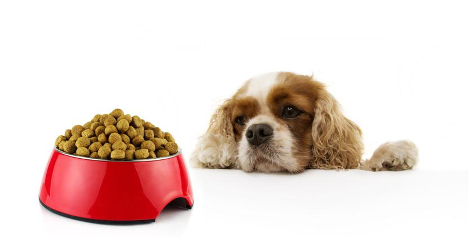

Buying the right dog food for your precious pet can be a daunting task. Every manufacturer posts a pretty picture and lists all the reasons why their dog food is the healthiest for your canine. Some pet parents choose to buy wheat-free formulations. Others choose “fresh” formulations found in the refrigerator case. Whatever brand or type of dog food you decide upon, do your dog a favor and avoid the following dangerous or disgusting ingredients at all costs.
#1 Ethoxyquin
There is much controversy surrounding the use of ethoxyquin in dog food. Perhaps it is because it is an ingredient that is commonly used in the making of rubber and pesticides. The reason that it is sometimes added to dog food, is that it is used as a fat preservative. More commonly, ethoxyquin is not added, but is found naturally in some fish meal that exists in dog food. This is particularly concerning because if it is not added to the food, but is instead found indirectly, you will not find it listed on the ingredient label.
A synthetic antioxidant, ethoxyquin has been deemed safe to use in animal feeds by the US Food and Drug Administration. Does this mean you should feed your dog food that contains ethoxyquin? Consider this, when given in higher doses to dogs, ethoxyquin may cause skin problems, allergic reactions, organ failure, behavior problems and even cancer.
#2 Propylene Glycol
Used as a moistening agent in dog food, propylene glycol is a particularly dangerous ingredient that you should avoid when reading your dog food label. Dog food manufacturers choose to use it to prevent bacteria from growing on food. Propylene glycol is particularly problematic because it is derived from ethylene glycol, AKA antifreeze. As you know, antifreeze is very toxic to animals. Strangely enough, today propylene glycol is approved for use in pet and human foods alike. While small, infrequent doses of this ingredient may not be problematic, giving it to your dog on a daily basis for a lifetime does not sound like a good idea to me.
#3 BHT
Added to extend the shelf life of fat in a dog food, BHT is the abbreviation for butylated hydroxytoluene. However, it is particularly disturbing to know all of the other places you will find BHT. It is used in rubber, petroleum products, and embalming fluid to name a few. BHT has recently drawn quite the attention because its chemical makeup has made it responsible for causing cancerous tumors. As it turns out, BHT is not the easiest chemical for the liver to break down. Because of this, BHT has been banned as a food preservative in Australia, Sweden, Japan and Romania. Although the FDA considers BHA to be safe for use, it has been identified by the World Health Organization’s International Agency for Cancer Research as a possible carcinogen.
#4 Corn Syrup
Corn syrup sounds harmless enough, doesn’t it? After all, we eat it in products like cereals every day. Corn syrup helps to make our food taste sweeter, and the same goes for dog food. Here is the problem with that. Over time, an abundance of sugar consumption may lead to health problems such as obesity, diabetes and hyperactivity in your dog. Dog food companies use corn and corn syrup as a filler, because it is very inexpensive. However, this can become problematic as mold or fungus can develop on the corn and make your dog gravely ill.
#5 Animal By-Products
What exactly are animal by-products anyway? They are basically the parts that are left over after the good parts are removed for human consumption. Does that not sound so bad to you? Let’s take a moment to identify some specific parts we are talking about. Animal by-products include: feet, lungs, heads, brains, spleen, kidneys, stomach, intestines and other parts considered by most as animal waste.
The reason dog food companies choose to include animal by-products is for one reason-they are cheap. Are they edible for your dog? Yes. However, they are of inferior nutritional value.
Know this. If the label uses a non-specific, generic term such as “meat meal,” this animal by-product meal may also contain the following: roadkill, dead zoo animals, poultry that is dead on arrival, and diseased or dying livestock.
#6 Xylitol
A sugar alcohol, xylitol is found naturally in foods such as berries lettuce and corn. Safe for diabetics, xylitol is not safe for dogs. Xylitol causes an insulin release in dogs, which in turn causes a dramatic drop in their blood sugar levels. If a dog ingests large amounts of xylitol, it can cause liver failure. Most dog foods do not contain xylitol, but even in small amounts, xylitol can cause vomiting, lethargy and a loss of coordination.
#7 Sorbitol
A synthetic chemical sweetener, sorbitol may also be added to dog food to make it taste better. The problem is that it makes the dog’s food taste so sweet, that it makes him want to overeat, and also reject foods that are not as sweet. Much like xylitol, it can cause hypoglycemia and obesity, and is also known to cause other digestion problems. Dogs who ingest sorbitol may experience diarrhea, vomiting, stomach cramps and bloody stools. Interestingly, sorbitol has also been linked to arthritis.
And there you have it! Avoiding these 7 dangerous ingredients may do more to promote your dog’s health that you realize.
